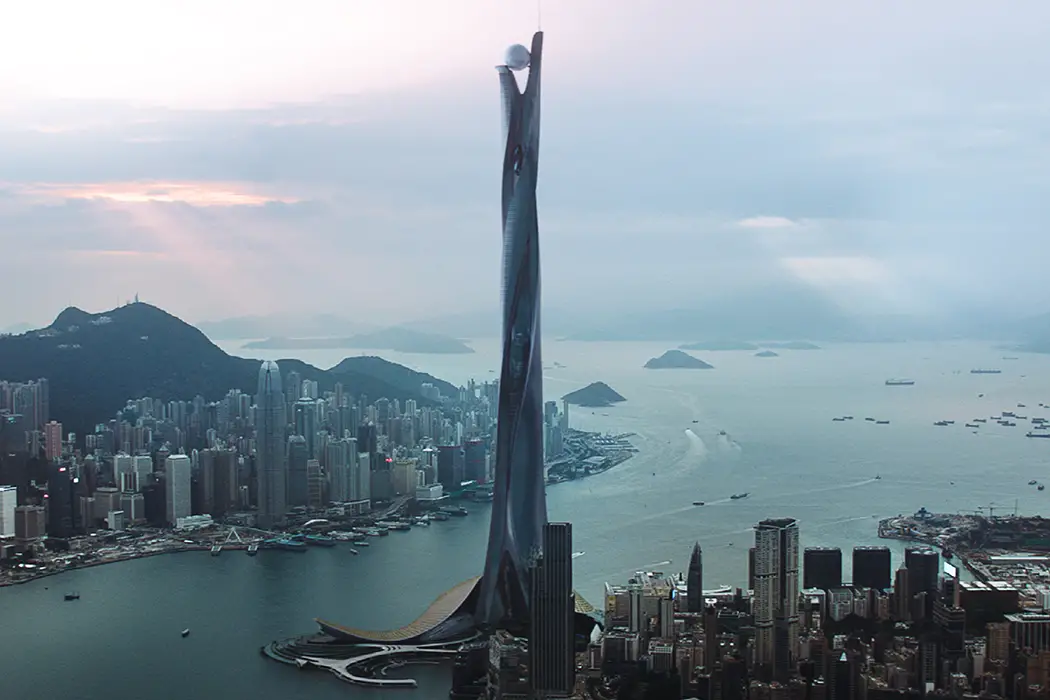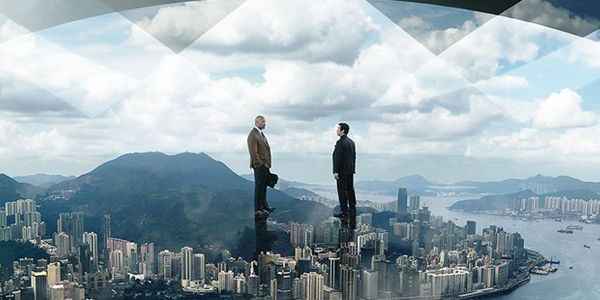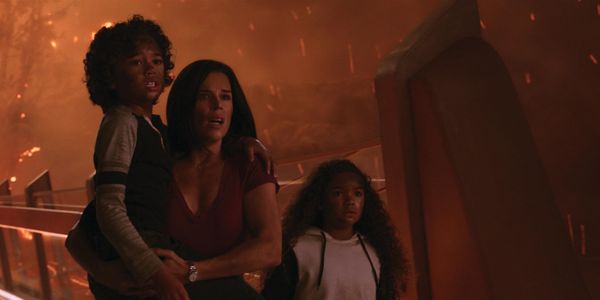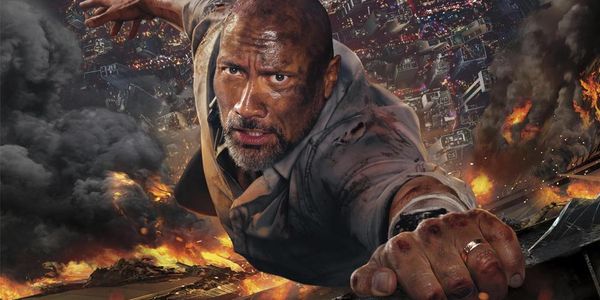SKYSCRAPER: Never Manages To Get Off The Ground

Tom is a recent graduate based in the UK, who…
Skyscraper is the perfect model of an uninspired action film: a mediocre idea saddled with mediocre characters and mediocre action.
The phrase ‘Die Hard but…’ often gets used to describe a certain kind of enclosed-space film, like ‘Die Hard but on a bus’ with Speed or ‘Die Hard but on a boat’ with Under Siege. It’s quite novel, therefore, for a film clearly inspired by the same tensions that made Die Hard great to be set in a skyscraper, as Die Hard was.
Skyscraper tells the story of Will Sawyer, a security analyst for The Pearl, a unique skyscraper. When terrorists storm the building and threaten to destroy it, he must mount a rescue operation to save his family, who are trapped inside.
While the action is well shot, and the skyscraper is visually and conceptually interesting enough to justify a film, there’s not enough creativity behind the camera to elevate the film from these foundations. The film copies too many action beats from Die Hard and doesn’t supplement them with enough original ideas, making the resultant product a forgettable drag.
Yippee-Ki-Plagiarism
The premise of the film bears more than a striking resemblance to that of Die Hard: a lone man scaling a skyscraper full of armed hostiles in order to save his family. Many films have taken the enclosed-space drama, with its corresponding tensions and atmosphere, and adapted it to great success, both before and after Die Hard. However, Skyscraper bears far too close a resemblance to the 1988 action classic to be considered anything less than a copy.

Many plot points from Skyscraper are taken wholesale from Die Hard, including a police enforcement ally on the ground who provides support for the hero, and a scene in which the hero must rappel down the building using improvised equipment. The proliferation of these scenes surpasses simple influence or homage, and it’s inconceivable to think writer and director Rawson Marshall Thurber did it by accident.
Even the garish overuse of Die Hard’s content would be mitigated with sufficient original ideas with regards to the plot or action sequences, but none surpass those copied from other films. Between the Mission Impossible: Ghost Protocol-esque roof-climbing and the Star Wars power generators that must be accessed, there’s no space for anything to distinguish the film as its own entity.
Opportunities such as a literal hall of mirrors at the top of the skyscraper introduced at the beginning, and a wife character who has a military background that’s never brought up, are completely wasted. There were many chances for the film to flex its muscles and deliver an interesting action set piece, but it seems Thurber is never bold enough to step out from the shadow of Die Hard.
While it’s acceptable, encouraged even, for a film to speak in a cinematic language that refers to and interacts with other films, Skyscraper clearly isn’t fluent in whatever this language is. It tries to speak it but ends up jabbering incoherently, like someone who did three Duolingo lessons and thought that was enough to converse like a native speaker. At best, the film seems blissfully unaware of the plethora of ideas it plagiarizes.
Hitting “The Rock” Bottom
Dwayne “The Rock” Johnson has a superb track record in elevating the most dubious film premise. His previous films Rampage and Jumanji: Welcome to the Jungle were entertaining and original, defying their expectations, at least in part due to his performances. Unfortunately, Skyscraper is Johnson’s biggest misstep in recent years – certainly his biggest since becoming the one of the most successful film stars of all time.

Most films that star Johnson work because his muscles and demeanor are matched by his charisma and energy – in many ways he is the 2010’s answer to Arnold Schwarzenegger. He can be simultaneously combative, wise-cracking, and empathetic. In Rampage his relationship to a giant CGI gorilla was as convincing as his military machismo; in San Andreas he successfully combined the roles of loving family man and heroic rescue pilot. He can deliver great performances in action scenes and character scenes.
However, in Skyscraper he can’t quite find a lane, and instead careers about with an odd lack of decisive tone or motivation. He’s quickly set up as a family man and yet never seems to be afflicted by guilt or dread at the likely fate of his family and his role in it. His military past is mentioned, yet at the film’s final confrontation his resolution to the problem seems to accidentally defy the military character arc. At random intervals he spurts out opinions relating to his job and the skyscraper that seem prescient but are immediately forgotten, or provides nonsensical quips about duct tape.

At least Johnson’s Sawyer is a rounded character. Sawyer’s wife is played by Neve Campbell; however, she only exists as an object to be rescued. No time is spent exploring who she is, what she does or what she thinks of the proceedings – instead she is defined solely through her interactions with Sawyer. Social media marketing for the film has attempted to depict her as a heroine who supports Sawyer, but the film itself never treats her as anything more than one name on a lengthy roster of throwaway characters.
It’s a sad day when Johnson fails to save a dumb action film, but at least perhaps he’ll think twice before accepting similar roles.
Conclusion: Skyscraper
It’s easy to focus on the film’s biggest problems, but that wouldn’t do justice to all the smaller issues. Characters deal with injuries that they aren’t shown to receive. The motivations of the villain are only explored in the final moments of the film. Many of the actions of the characters make no sense, and they often forget very obvious plans of action until too late. The music has a distracting tendency to juxtapose the tone of the scene. The skyscraper’s many interesting features are barely featured in the film, and the few that are have no reason for existing in the film’s universe save for visually diverse action scenes.
Any brief glimpses of an interesting film are quickly lost in the towering, monumental shadow of a film that just didn’t try. Thurber didn’t try to make the film anything more than a Die Hard clone; Johnson didn’t try to give the film the resuscitation of his typical wonderful performance that it needed; Universal Pictures didn’t try to distance the film from the predecessors it would inevitably be compared to.
Skyscraper takes all the elements that made Die Hard memorable but not the elements that made it great. Instead it lurks around its foundations, hoping its foreman will start building it up to any of the heights of its predecessor. He won’t.
Is there a way of making an enclosed space action film that isn’t compared to Die Hard?
Skyscraper was released in the United States and United Kingdom on July 1.
Does content like this matter to you?
Become a Member and support film journalism. Unlock access to all of Film Inquiry`s great articles. Join a community of like-minded readers who are passionate about cinema - get access to our private members Network, give back to independent filmmakers, and more.
Tom is a recent graduate based in the UK, who writes about films and games, and makes a few of his own. If he's not watching a film, playing a game or writing a script - don't worry! - he's probably just gone to make a cup of tea. He's never far from a screen.











